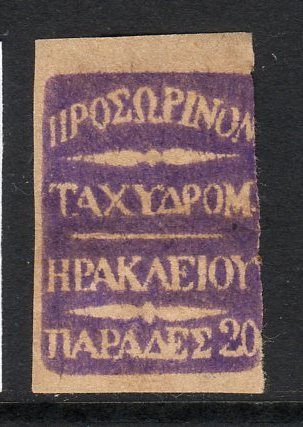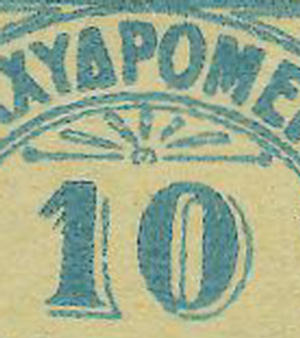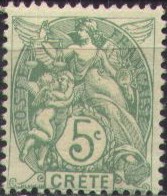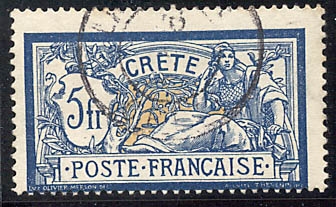 |
|||||
|
|||||
| Preview of Stamps Catalogue: VOLUME 1 |
 |
|||||
|
|||||
| Preview of Stamps Catalogue: VOLUME 1 |
Note: on my website many of the
pictures can not be seen! They are of course present in the catalogue;
contact me if you want to purchase it.
20 p violet
Value of the stamps |
|||
vc = very common c = common * = not so common ** = uncommon |
*** = very uncommon R = rare RR = very rare RRR = extremely rare |
||
| Value | Unused | Used | Remarks |
| 20 p | RR | RR | 4000 stamps printed |
Literature: 'Counterfeits of the 1898 provisional 20 parades stamps of the the British post office in Crete, hints for their recognition' by William R. Liberman (1973), 18 pages (Greek and English text). There are at least 6 different kind of forgeries.

Forgery. In the genuine stamps, the first and last letters of 'PROSWRINON' are touching the white outer
border (here there is a small colored area between those letters
adn the border). The figures '2' and '0' should join at the top
only. Here they are fully separated. The P of
PARADES should touch the white border.

Forgery with P of PARADES
not touching the left white space. The '2' is joined to the '0'
at the bottom (should be the top!). I've seen this forgery with a
convincing forged cancel.


(Reduced sizes)
10 p blue 10 p brown 20 p green 20 p red
Value of the stamps |
|||
vc = very common c = common * = not so common ** = uncommon |
*** = very uncommon R = rare RR = very rare RRR = extremely rare |
||
| Value | Unused | Used | Remarks |
| 10 p blue | * | c | |
| 10 p brown | * | c | |
| 20 p green | * | * | |
| 20 p red | * | * | |
Cancels: Cancels are simply consisting of a townname in a straight line (as in the above 10 p brown stamp), ten different cancels exist for ten different towns (with Heraklion the most common one).
Forgeries exist of these stamps. To distinguish between genuine and forged stamps we have to look at the small circle with a dot just above the numerals. In the genuine, the circle is closed; in the forgery, the circle is not joined. More information about the forgeries can be found at: http://www.themysterybox.com/StampWhys/crete/AaGB.html. Example of a forgery:

(Zoom-in of the small open circle in this forgery)

Genuine stamp, zoom in of the closed circle
Forged Fournier cancel:

Forged stamp and forged overprint as found in the Fournier Album.

The forger Fournier used this cancel; picture taken from a
'Fournier Album of Philatelic Forgeries'
Fiscal stamps exist with the flag of Great Britain and the city name in the bottom (1898). These handstamped seals were also often applied directly on documents.

Fiscal 'stamp' from the city of 'KANDIA'.





1 c grey 2 c lilac 3 c red 4 c brown 5 c green





10 c red 15 c orange 20 c brown 25 c blue 30 c lilac





40 c red and blue 50 c brown and green 1 F red and blue 2 F lilac and yellow 5 F blue and yellow Surcharged in PIASTRE (1903)
1 pi on 25 c blue 2 pi on 50 c brown and green 4 pi on 1 F red and blue 8 pi on 2 F lilac and yellow 20 pi on 5 F blue and yellow
These stamps have perforation 14 x 13 1/2.
Value of the stamps |
|||
vc = very common c = common * = not so common ** = uncommon |
*** = very uncommon R = rare RR = very rare RRR = extremely rare |
||
| Value | Unused | Used | Remarks |
| 1 c | c | c | |
| 2 c | c | c | |
| 3 c | c | c | |
| 4 c | c | c | |
| 5 c | c | c | |
| 10 c | * | * | |
| 15 c | * | * | |
| 20 c | * | * | |
| 25 c | * | c | |
| 30 c | * | * | |
| 40 c | * | * | |
| 50 c | * | * | |
| 1 F | * | * | |
| 2 F | *** | *** | |
| 5 F | *** | *** | |
| Surcharged | |||
| 1 Pi on 25 c | *** | *** | |
| 2 Pi on 50 c | *** | *** | |
| 4 Pi on 1 F | R | R | |
| 8 Pi on 2 F | R | R | |
| 20 Pi on 5 F | RR | RR | |
The French post office in Crete was closed on 31st October 1914.